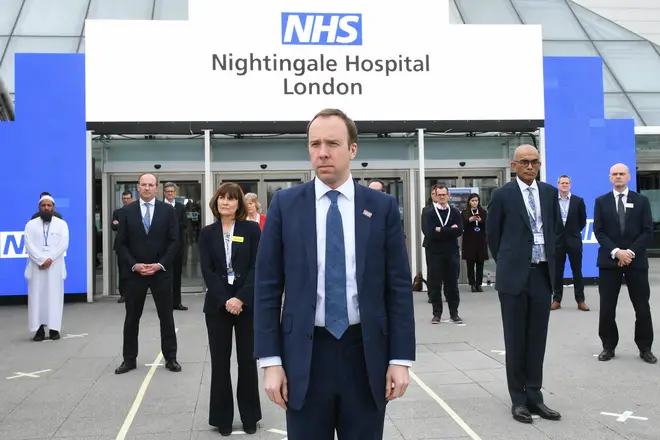
Iain Dale 7pm - 10pm
17 April 2020, 11:50

"NHS Nightingale is failing to support London's drowning hospitals"
This health editor tells LBC why NHS Nightingale is failing to support London's drowning intensive care units during the pandemic.
London's NHS Nightingale is failing to support intensive care units, clinicians have told Independent health editor Shaun Lintern.
Much-needed equipment is being diverted from the city's hospitals to the Nightingale despite it only having around 30 patients, said Mr Lintern, who yesterday published a piece questioning the efficacy of the temporary hospital.
"There are some hospitals in London that are struggling at the moment because there are a large number of patients being ventilated and intubated in intensive care - they feel Nightingale isn't providing the extra help it was expected to," he said.
"One nurse I spoke to said it was like they were screaming into a vacuum and nobody was hearing them. They said they have patients and they needed the help now, and their sense was the Nightingale wasn't."
Shelagh questioned why patients are not being transferred to Nightingale.
Shaun responded: "A concern that has been raised is the admissions criteria for the Nightingale. A lot of this unfortunately is still shrouded in mystery because NHS England hasn't really been very transparent about exactly how the hospital will work, how many patients it does have and how many staff and how it's operating.

"Staff in other departments are saying they are struggling to the get the Nightingale to accept patients because in effect its admissions criteria is set at a level whereby the most sick patients won't actually meet the criteria.
"The problem with coronavirus specifically is once you're ventilated and intubated, most intensive care doctors I've spoken to...are saying all of the patients are very very sick. There are not that many well patients and there may not be for quite some time," Shaun said, and predicted the Nightingales in other parts of the country are likely to be used as recovery facilities.
"Is that necessarily a bad thing, if that's what happens in London?" Shelagh asked.
Shaun responded: "No...but I think what everyone needs to keep in mind is I think we've heard several comments on different broadcast interviews by ministers and NHS chiefs...where they say the NHS has got spare capacity and it's not being overwhelmed.
"That is true and is worthy of praise...but what people need to remember is that spare capacity means a lot of patients in former operating theatres, recovery areas and effectively extra spaces that have been created.
"And they're being ventilated with anaesthetic machines which have not been designed for continuous use and staffing levels to look after all those patients are being really stretched and that's the situation at a lot of hospitals in London."
NHS staff are asking for the London's Nightingale to open its doors and take the weight off of other hospitals.
A senior nurse told Mr Lintern that staffing levels in some units are "actually dangerous" and that there would be errors and mistakes made because of how rushed off their feet staff are - "they feel Nightingale needs to be providing more help right now."
"There are questions now emerging as to whether the NHS staff can really maintain that level of effort," he said, "there's a real risk of burning out."